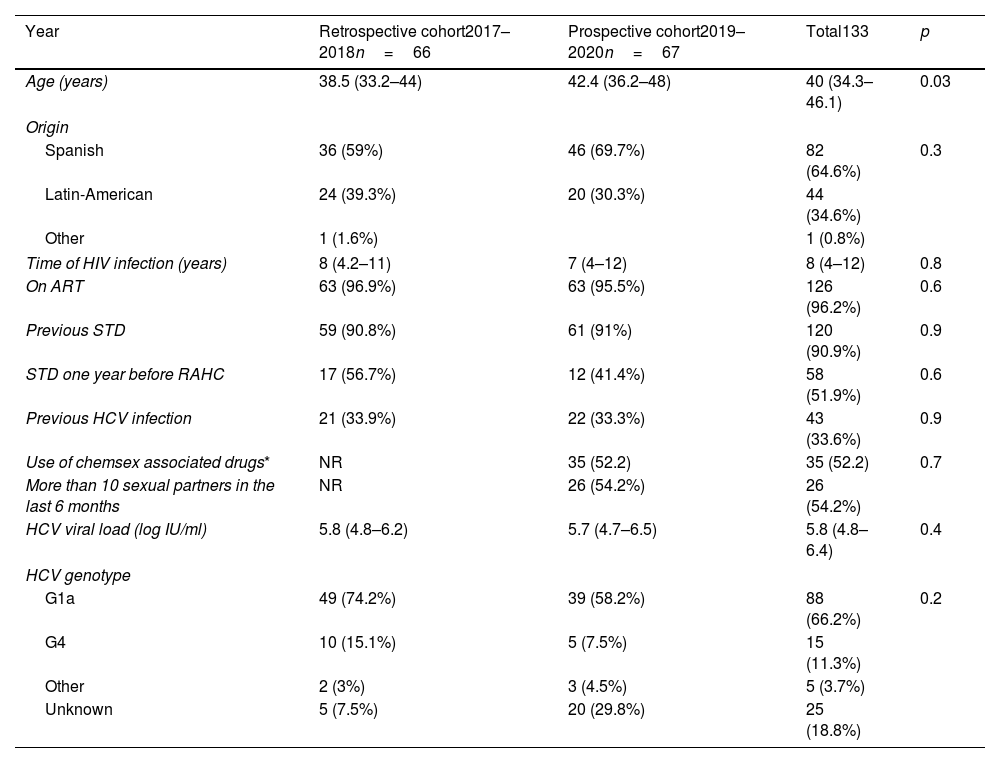We analyzed epidemiological, clinical characteristics, and the response to treatment in people living with HIV (PLHIV) who recently acquired hepatitis C (RAHC) in a multicentre study in Madrid (Spain).
MethodsMulticenter, ambispective, observational study of RAHC in men who have sex with men (MSM) infected with HIV. Clinical, epidemiological, and RAHC evolution were recorded prospectively in 2019 and 2020 and retrospectively in 2017 and 2018. In patients who received HCV treatment, sustained virological response (SVR) was provided 12 weeks after the end of treatment in an intention to treat analysis (ITT): all treated patients were included; and in analysis per-protocol (PP): missing patients were excluded.
ResultsOverall, 133 patients were included. Median (IQR) age was 40 (34.3–46.1) years, 90.9% had at least one previous sexual transmission disease (STD), and 33.6% had previously hepatitis C. More than half of the prospective sample included patients using chemsex related drugs (57.3%), 45.7% of them intravenously. The most prevalent genotype was G1a (66.2%), followed by G4 (11.3%). Ten of 90 patients evaluated for spontaneous cure (11%) cured the infection spontaneously, and 119 had treatment after a median time of 1.8 (0.7–4.6) months: sustained virological response (SVR) was achieved in 90.7% in the ITT and 94.7% in the PP analysis, with no differences regarding the direct-acting antiviral agents (DAA) combination used.
ConclusionsMSM infected by HIV with a RAHC were exposed to high-risk sexual behavior. Spontaneous cure rate was low, while SVR after treatment was achieved by more than 90%.
El objetivo de nuestro estudio fue analizar las características epidemiológicas, clínicas y la respuesta al tratamiento en personas que viven con VIH (PVIH) con hepatitis C recientemente adquirida (HCRA).
MétodosEstudio observacional multicéntrico que incluye PVIH, hombres que tienen sexo con hombres (HSH), con una HCRA durante los años 2017 y 2020 en Madrid. Los datos se recogieron prospectivamente los años 2019 y 2020 y retrospectivamente los años 2017 y 2018. En los pacientes que recibieron tratamiento se calculó la respuesta viral sostenida (RVS) a las 12 semanas de acabar el tratamiento en un análisis por intención de tratar (IT) (incluye todos los pacientes) y por protocolo (PP) (excluye las pérdidas).
ResultadosSe incluyeron 133 hombres: edad mediana (RIQ) 40 (34,3-46,1) años, 90,9% con antecedentes infecciones de transmisión sexual (ITS) y 33,6% con hepatitis C previa. Los pacientes incluidos prospectivamente rellenaron una encuesta sobre hábitos tóxicos y 57,3% declaró haber practicado chemsex (45,7% de estos por vía intravenosa). Los genotipos más frecuentes fueron el G1a (66,2%) y el G4 (11,3%). Tan sólo 10/90 pacientes evaluados (11%) curaron sin tratamiento. Tras una mediana de 1,8 meses (0,7-4,6), 119 pacientes recibieron tratamiento (43 de manera precoz y 76 tras evaluar posible curación espontánea). La RVS fue 90,8% (IT) y 94,7% (PP). No observamos diferencias en los diferentes regímenes de antivirales de acción directa usados.
ConclusionesLos HSH con infección por VIH con HCRA en Madrid están expuestos a prácticas sexuales con alto riesgo de ITS y reinfección del VHC. La curación espontánea es baja, mientras que la respuesta al tratamiento es mayor al 90%.
Article
Socio de la Sociedad Española de Enfermedades Infecciosas y Microbiología Clínica

Para acceder a la revista
Es necesario que lo haga desde la zona privada de la web de la SEIMC, clique aquí









